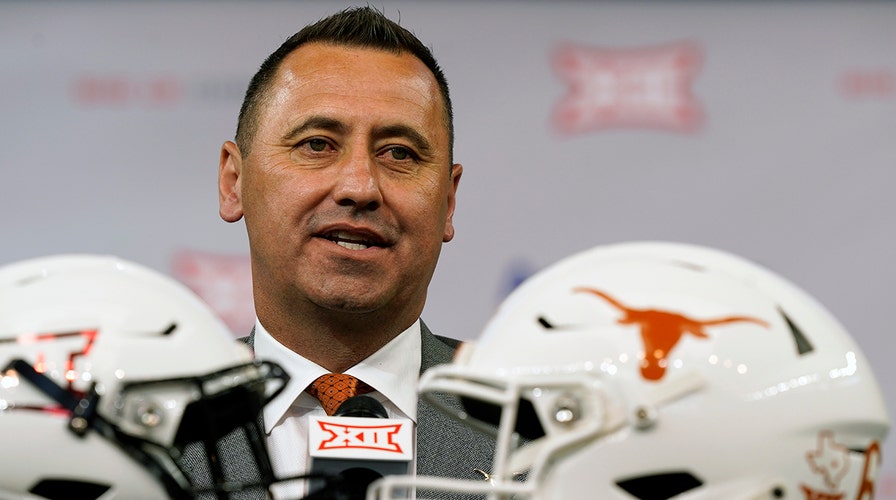Fox News Flash top headlines for July 21
Fox News Flash top headlines are here. Check out what's clicking on Foxnews.com.
The last time Texas got a wandering eye for another conference it fueled a series of realignments in college sports that nearly killed the Big 12.
Texas is once again exploring free agency, stealing the headlines at the Southeastern Conference media days and cranking up speculation about another round of conference shuffling. And the Longhorns aren't alone in looking around.
There have been discussions between Texas and Oklahoma and SEC officials about switching conferences, but no formal invitations have been extended, a person with knowledge of the situation told The Associated Press on Wednesday night.
CLICK HERE FOR MORE SPORTS COVERAGE ON FOXNEWS.COM
The person, who spoke on condition of anonymity because the talks were intended to be confidential, said officials from Texas initiated the discussion. The Houston Chronicle first reported the discussions.
Adding two members would give the powerhouse SEC 16 teams, the most in major college football. Losing two schools would be a devastating blow to the 10-member Big 12.
Questions about the report were greeted by a series of no comments from the primary parties involved, but no denials.
"I’m talking about the 2021 season," SEC Commissioner Greg Sankey said at SEC football media days.
Texas A&M athletic director Ross Bjork was adamant about not wanting the Longhorns, once the school's greatest rival, in the SEC.
"We want to be the only SEC program in the state of Texas," Bjork told reporters. "There’s a reason why Texas A&M left the Big 12, to be standalone, to have our own identity. And that’s our feeling."
SEC bylaws require at least three-fourths (11) of the members to vote in favor of extending an invitation to join.
"The college athletics landscape is shifting constantly," Oklahoma said in a statement. "We don’t address every anonymous rumor."
A Texas statement offered a similar response: "Speculation always swirls around collegiate athletics. We will not address rumors or speculation."
Big 12 Commissioner Bob Bowlsby did not return messages from AP seeking comment. Just last week at Big 12 media days in Arlington, Texas, he talked about how conference realignment was no longer a top concern for the Big 12.
"Not to say it couldn’t happen, but it’s not one of the things that keeps me up at night," he said.
Any move to leave the Big 12 would be complicated by an agreement its schools made after the last round of realignment to hand their media rights over to the league through their current television deals. The grant of rights lines up with the Big 12's contracts with Fox and ESPN and runs through the 2024-25 school year.
Back in 2010, the then Pac-10 tried to woo Texas and five other Big 12 schools into the West Coast-based conference to form a Pac-16.
Texas stayed put and instead started its own television network. After another flirtation between Texas, Oklahoma and then-Pac-12 Commissioner Larry Scott, Texas A&M bolted for the SEC in 2012 and Missouri followed.
The Big 12, which had already lost Nebraska to the Big Ten and Colorado to the Pac-12, managed to hang on by inviting TCU and West Virginia.
College sports was turned upside down for about three years as conferences jockeyed to fortify themselves and schools scrambled to not be left out. The Big East was poached right out of the major college football business before finally reconstituting as the American Athletic Conference.
Life without Texas and Oklahoma would be uncertain — at best — for the other schools in the Big 12.
Even an unconfirmed report, prompted an assertive response from Oklahoma State.
"If true, we would be gravely disappointed," the Cowboys’ statement said. "While we place a premium on history, loyalty and trust, be assured, we will aggressively defend and advance what is best for Oklahoma State and our strong athletic program, which continues to excel in the Big 12 and nationally."
The mere possibility of adding Texas and Oklahoma to the strongest football conference in the country is certain to draw the attention of the other Power Five conferences. Especially as the leaders of those leagues look to expand the College Football Playoff from four to 12 teams.
Oklahoma is the only Big 12 team to make the playoff, doing so four times. The road to the CFP would be tougher through the SEC but a bigger field could provide more paths.
The SEC recently signed a new television deal with ESPN that gives the cable TV sports giant all of its rights. It is unclear if adding Texas and Oklahoma would create an opportunity for the SEC to increase the value of those contracts for all its members and not just provide enough to cover additions at the current rate.
The SEC announced earlier this year it had distributed about $45.5 million each to its members. The Big 12 schools received about $10 million less from its conference.
When Texas A&M coach Jimbo Fisher was asked about Texas and Oklahoma being interested in the SEC during his session with the media in Hoover, he said: "I bet they would.""
"Listen, we’ve got the greatest league in ball," Fisher said. "That’s the choices they make or what they do, I don’t know, but I don’t know how I feel about it."









































